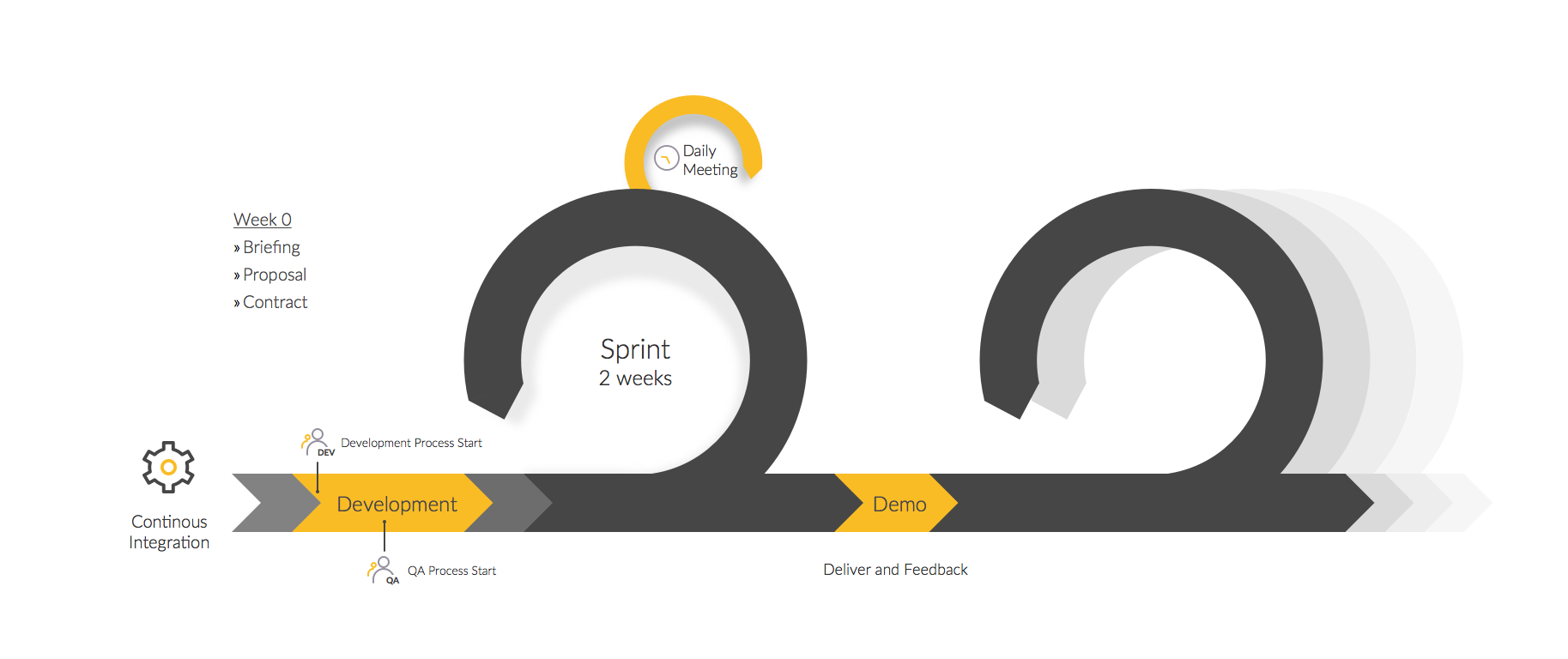Table of Contents
Many people consider switching to Agile. Good initiative! A good start would be to get a good understanding of scrum sprints. So here’s a scrum sprint explanation that should get you started.
What is scrum? A feedback-driven approach
Scrum methodology is an iterative and incremental framework of software agile development that was created to help teams when it comes to managing the development process. Although it is mainly used in the software industry, it can also be used in many other industries. What is great about agile scrum is that it emphasises on collaboration, working software and flexibility to adapt to change. Transparency, inspection, and adaptation are keywords when you talk about agile scrum. Process, workflow and progress are indeed always visible! In fact, teams have regular meetings (physical or online) with all the members and communication is highly encouraged, enabling the team to self-organise. Talking about the team, it usually is composed by around 7 people, each one having a different role. The idea is that the team works in short activities that are called “sprints” where inspection & reviews are very important. The focus is mainly on continuously improving the processes and product itself.
Main roles of the scrum team
Product owner
The product owner represents the customer, he always has to have a vision of what needs to be built. One of his main role is to express it and make it clear to the scrum team. He is the one who owns the product backlog and that prioritises the orders of the items, but this doesn’t mean that he is the one to choose how much and how it will be done during the sprint.
Scrum master
The Scrum Master helps the Product Owner and the team understand their common objectives and assists them when it comes to the planing on how to achieve these goals. He is an advisor and a coach for both parties and has to ensure that the team will reach its sprint goals. and As the team is self organised, the scrum master has to stay neutral and doesn’t really have an authority what so ever.
Scrum team members
The team is self organised and its members are responsible for completing the user stories that were set, always ensuring to add value to the product. One of their tasks is to give estimates for each sprint and they decide how the work will be done.
Agile scrum sprint explanation

First thing you should know is that the scrum sprint is a work cycle that is regular and repeatable where we finish the “work” that we determined in the beginning of the process, making it ready to be reviewed. Although a scrum sprint is usually of 30 days, we prefer doing these iterations in two-weeks. During each one of our sprints, we create a product that is shippable. It can be very basic, and it’s not an issue. In fact, the idea is to deliver something that works, because let’s be honest, in 2 weeks times, you can’t put all the functionalities. The idea is to start with little, but having the most essential ones. In a way, this also gives a good view of the progress to the client. Unless the project is very short & basic, the final product will be done in more than one sprint. So every time we start a new sprint, we are working and doing iterations on the last one that was done.
Sprint planning meeting
All sprints should start with a meeting where the team discusses and plans/organises the sprint. They first start by setting goals and determining what will be the deliverables for the sprint. The team identifies the user stories that will be moved from the Product Backlog (a cumulative list of deliverables for the product) into the sprint backlog (a to do list for the sprint). Basically, what will be done and how will it be done? Keep in mind that work should’t be added to the sprint once it has started. Also, if something hasn’t been done by the end of the sprint, we just need to pass it to the backlog and prioritise it.
Daily scrum meeting
The day starts with with the daily scrum meeting. A brief meeting where the team members do a checkup helping solve problems. They talk and see how everything is going, what has been done, what will be done during that day and if there are any problems encountered. It is also called the standup.
Scrum sprint review
The scrum sprint review marks the “public” end of the sprint. Every stakeholder should be present during the meeting and the team get the chance to talk about the user stories that could not be completed (if there are any) and they then can show the work done. From the other side, the product owner can see the improvements done to the product.
During this phase, feedback is very important. And remember, this is not a meeting where decisions are taken, that happens during the Sprint planning meeting.
Agile retrospective
As I mentioned earlier, the scrum sprint review is the “public” end of the sprint. But for the team, at the end of each sprint, the retrospective meeting is what marks their end. The team has a meeting to share what has worked and what hasn’t worked. How can processes be improved? The idea is to find 1-2 new strategic changes to apply to the next sprint.
Hopefully with this article you got a better understanding of how scrum sprint works and how it is a feedback oriented approach. I really believe that this way of working helps avoid huge problems and adapts much more to the customer’s needs. We also decided to apply this way of working to the rest of our departments and to be honest, we all found it extremely efficient!
Finally, if you’re looking for software development companies that could help you with one of your projects, here’s a list of great software development companies in Europe, give it a look!
Author
More to Explore









